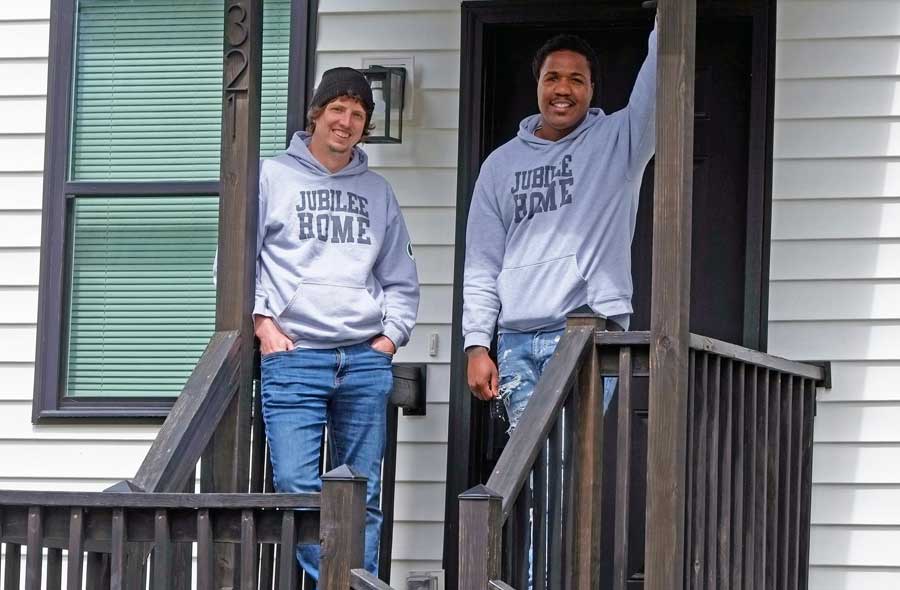By Mia Khatib
mia.khatib@triangletribune.com
DURHAM — Jubilee Home has been uplifting formerly incarcerated men since 2020, providing them with housing, therapeutic services, and support resources to help them take charge of their lives and independence. Now, they’re expanding their mission to women.
The nonprofit purchased a house across the street, on East Umstead Street, that will house three to four justice-involved women for up to a year. Executive director Dave Crispell told The Tribune they get tons of calls from women seeking their services that they can’t provide.
“There’s way less women that are incarcerated that are coming out, but there’s just way less services or housing opportunities,” he said. “And so we’re trying to meet that gap.”
While the model will remain largely similar to the men’s, Crispell said they will have to be more intentional about employment opportunities and therapy intervention. He said they’ve built up a solid network of places that will employ their male residents, but some of those spaces may be unsafe or triggering for women.
“They may be in a warehouse, they may be in some male-dominated spaces or things that can be difficult for someone who is carrying trauma, maybe from similar places,” he said. “We will also most likely be open to trans people who identify as women. That’s a pretty big need, too, that we know exists without an outlet.”
Certified peer support specialist Joshua Lyles, who is a former resident, told The Tribune he’s been in and out of incarceration since he was 14, but it was Jubilee Home’s support and resources that helped him maintain his progress and thrive post release.
“It was just like that team of people who were rooting for me, and it feels good to have people rooting for you… especially as I’m going through the process of starting over for the fourth time,” he said. “There’s a lot to gain from this environment and space that’s being offered.”
Lyles began working in the organization’s community garden and now has his own landscaping business, Do Dats Landscaping. As a peer support staffer, he’s glad to set an example for residents.
“Since I’ve lived in spaces like this, I was familiar with the things that weren’t working and some of the things that was like triggering,” he said. “It was good to be able to provide resources that I know will work.”
Despite turning his life around, Lyles struggled to secure permanent housing on his own and his partner had to sign their lease. Others moving out of Jubilee Home after residency have the same experience. Criminal records and poor credit are major barriers to housing.
That’s why, Crispell said, Jubilee Home plans to venture more into permanent housing. They already own one duplex for men a street over, on Dawkins Street. It is home to four former residents, including Ed Chapman, who was exonerated after spending 15 years on death row for a wrongful conviction and has struggled with substance abuse and addiction.
“I get my independence back,” Chapman, who is also a new Jubilee Home board member, told The Tribune. “I’m loving it.”
Chapman has been in and out of different housing and recovery programs, but said most of them were terrible living conditions and even likened a few to concentration camps. In one case, he lived with nine people in a three-bedroom apartment “infested with cockroaches, scabies and bed bugs” and paid $390 to sleep on a chair.
Jubilee connected him with the resources he needed to get back on his feet. He bought a car through the nonprofit StepUp Durham and started attending culinary school at Durham Technical Community College.
“When you step in that house, you’re not going in there on a journey by yourself. They take that role with you, they’re walking beside you,” he said. “That’s what I love about Jubilee Home, they’re not like some [other] programs.”
Often, justice-involved people are forced to turn to rooming houses, but Crispell said they don’t have tenants’ rights. Leases offer renter and landlord protections, he added, as well as stability and reassurance that you won’t lose your home.
“We had a gentleman leave here, a few months ago, [that] was making $60,000 a year. He couldn’t find housing because he could not pass those backgrounds,” he said. “Permanent housing, I think, is really a big difference and there’s just not enough out there.”
Mia Khatib, who covers affordable housing and gentrification, is a Report for America corps member.

